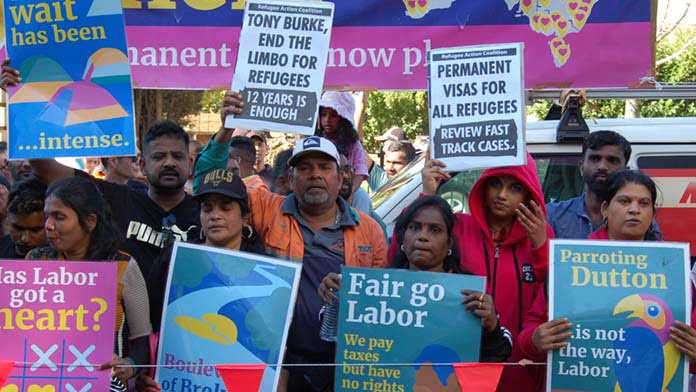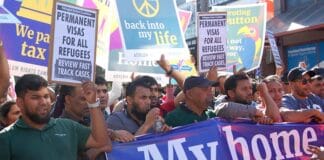Refugees have begun a series of continuous 24-hour protests for permanent visas, with encampments in Melbourne, Sydney and Brisbane as well as protests in Adelaide.
Pressure on the government is building, with 25 federal crossbench MPs writing to the Prime Minister to call for a “pathway to permanency” for them.
They are among 8000 refugees who have been living in limbo for at least 12 years, after their claims for asylum were rejected under the unfair Fast Track process. About 1000 who were detained on Manus Island and Nauru and later medevaced to Australia are also being denied a permanent visa.
The protests began in Melbourne, where refugees have been camping out for more than 50 days, first at the office of then Home Affairs Minister Clare O’Neil and now outside the Department of Home Affairs in the Docklands after she switched portfolios.
A rally there on 16 August drew 400 people with a contingent from the United Workers Union joining the protest, which was addressed by a state Greens MP.
A small group of Nazis gathered nearby in a failed attempt to intimidate the rally but had to slink off after being drowned out by the crowd.
There are now rallies at the encampment every Friday at 5.30pm.
In Brisbane hundreds are protesting outside Treasurer Jim Chalmers’ office in Logan.
Refugees in Sydney have been outside the office of the new Home Affairs Minister, Tony Burke, in Punchbowl for almost a month.
Both Burke and Jim Chalmers have now met with delegations from the protests.
At the end of August several hundred refugees marched through Punchbowl to the office chanting “permanent visas now”.
“There’s been 150 to 700 people each day,” Kalyani Inpakumar of the Tamil Refugee Council told Solidarity. “People might come in the morning before work and then go or they’ll come after work.”
“When we started, between 25 and 30 people would sleep every night. Now, it’s a little bit less because people have families and need to go to work,” Iranian refugee Shah said.
Kalyani added, “We had a community meeting where 65 people attended and ten leaders were nominated who organise everything. There’s a lot of consultation, so I think everybody feels part of the protest.
“We’ve been getting meals from our community. We’ve had three meals a day provided for the last 25 days.”
Life in limbo
In late August the torment of living without a permanent visa claimed another life, as 23-year-old Tamil asylum seeker Mano Yogalingam committed suicide in Melbourne. He had arrived in Australia with his parents at the age of 11 after fleeing Sri Lanka.
Vigils for Mano drew big crowds at the refugee encampments, and were followed by another vigil for Sasikaran Selvanayagam, a Tamil refugee who died later the same week.
Living on bridging visas without permanent status means the refugees find it harder to get work and are denied the right to study or travel. Many have been left separated from partners and children and are unable to travel to see elderly parents or attend funerals.
Labor has so far refused even to review the claims of Fast Track refugees, despite admitting that the process the Liberals used was unfair. It’s one example of their shameful commitment to the same border protection and anti-refugee policies as Peter Dutton.
“When I finished high school, I got an offer from Macquarie University to do a three-month intensive program and I was going to do a Bachelor of Psychology,” Sariah, a 19-year-old Tamil refugee told Solidarity.
“I had to pay $17,000 for the three-month course. Three weeks in the Immigration Department called me and they said that I’m not allowed to continue my studies and I was forced to withdraw from my course.”
The refugees are supposed to have access to Medicare but this expires when they have to renew their visas.
“I came here in 2013,” said Shah. “I’m paying tax every year but I can’t even use Medicare. When my Medicare expired, I had to apply again, and they gave me three months’ Medicare.
“But that took two months to arrive. So I only had Medicare for one month. When I don’t have it, I can’t go to hospital, I have to pay $130 to see a GP.
“We have called Australia our home for 12 years,” said Shah. “The only thing we ask is for a permanent visa.”
Everyone needs to support their fight and build the pressure on Albanese to give them permanent visas.
By James Supple






